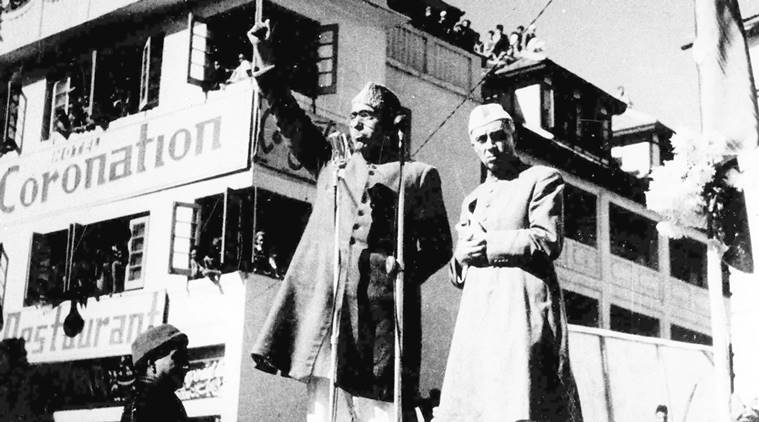When Sheikh’s Diehard Felt Deceived: A Portrait of a Political Loyalist

Arif Nazir is a Staff Writer at the Mountain Ink.
After New Delhi’s last summer step, the loyalist of Kashmir’s grand old party and its “tallest leader” felt disheartened, disappointed and deceived.
More than a year back, as the valley woke up to the news of abrogation of Article 370, my grandfather Abdul Samad Dar took a routine walk in our sunny- cum-sullen lawn. With a trammelling and low pace, he held his radio-set, struggling to listen the fall of the last vestiges of the region’s semi-autonomous charade.
“Yemov chu khatmie kormut sourie (They’ve destroyed everything),” he said after settling down—yet unsettled—on his regular chair.
For almost a year since then, his routine read of two newspapers during the first half of the day became more of an old-habit-die-hard engagement, than an age-old conviction of a voracious reader.
“Dadu chu intiqaal pur malaal taam paraan (Grandpa even reads obituaries),” a gossip we would often laugh-out was actually a telling comment on the octogenarian’s backbreaking morning routine since decades to stay politically updated.
But after New Delhi’s last summer step, the loyalist of Kashmir’s grand old party and its “tallest leader” felt disheartened, disappointed and deceived.
Support Our Journalism
You are reading this because you value quality and serious journalism.
But, serious journalism needs serious support. We need readers like you to support us and pay for making quality and independent journalism more vibrant.
His glum face would tell it all, during his newspaper reading, or ‘all ears’ Shaherbeen, sessions.
His assumptions and perceptions specifically post August 5 cleared some of my confusions regarding a textbook follower of Sheikh Mohammad Abdullah.

A few months ago, as Dar opened up about his journey of being pro-Abdullah, he remembered a rally in the early 1940s. He had participated that massive gathering as a 9-year-old kid. Kashmir was then rallying for Quit Kashmir movement, with a resounding slogan: “Mahaadai Amritsar Todd dou, Kashmir Hamara Chod Dou (Break the Treaty of Amritsar and vacate the valley).”
Till his last breath, he savoured the Salvador image of Sheikh Abdullah. Nothing would alter his love and loyalty for his leader.
Having grown up in a family where his father Abdul Ahad Dar who was part of the anti-Maharaja strike carried out by Silk Factory workers during early 1920s, seeing up-to Sheikh Abdullah was no coincidence.
“Those who turned against Sheikh Saab or the cause he stood for had no chance or the credibility as he suffered greatly for his people,” Dar would always defend his leader.
Be it call for Indian army amid ‘Tribal War’ or the “Conditional Accession” with the Union of India, Dar believed Sheikh had no role to play.
It was Maharaja, he would say, who had an absolute authority to make the decisions himself.
“Even Sheikh Saab’s comrades didn’t miss a chance to tarnish his image by presenting him as a key decision-maker and a traitor behind his back,” he would conveniently cover up his leader’s mistakes.

Over the famous couplet—“Mann tu shudam, tu mann shudie…”—that Sheikh sang for his friend Nehru at Srinagar’s Lal Chowk, Dar would flash a sarcastic smile.

“Poetry is open-ended writing. It could mean different to different people,” the diehard would say.
Dar always vouched for Sheikh’s “bigger and broader” vision, “as he knew the politics and its repercussions inside out”.
“Did anyone speak or bother to agitate for him when he was jailed by the same regime he sang paeans for,” Dar said indignantly while adding, “Kahn dravus ni wafadaar (None stayed sincere to him).”
Even the controversial Sheikh-Indira Accord made different sense to Dar, “more of a strategic call, than deceit”.
“That accord at least saved some of our eroded autonomy,” Dar argued. “Otherwise people had already given away everything when Sheikh Saab was in jail.”
Yet it was Dar’s conviction making him travel miles to have a glimpse of his beloved leader.
Be it Eidgah on the day of Eid or on the Friday prayers at Dargah Hazratbal, he would carry the red badge with a plough at its centre in his right pocket to listen or see Sheikh Abdullah.
Anything and everything that made Dar sound pro-India would be sourced from his leader.
But there always were times that presented the other side of the line. Like a cricket match between India and Pakistan.
During the “turf war”, Dar would be as much sad as everyone else, if Pakistan loses or vice-versa.
Yet for a man who all his life never perceived to be anything like pro-India or pro-NC, what only made sense to him and the whole of his generation was being pro-Sheikh Abdullah and the slogan that served the cause, “Yee Babass Khoash Karri, tee karri loou loou (Whatever pleases Sheikh Abdullah would be acceptable to us).”
To help us strengthen the tradition of quality reading and writing, we need allies like YOU. Subscribe to us.
Mountain Ink is now on Telegram. Subscribe here.
Become Our Ally
To help us strengthen the tradition of quality reading and writing, we need allies like YOU. Subscribe to us.









